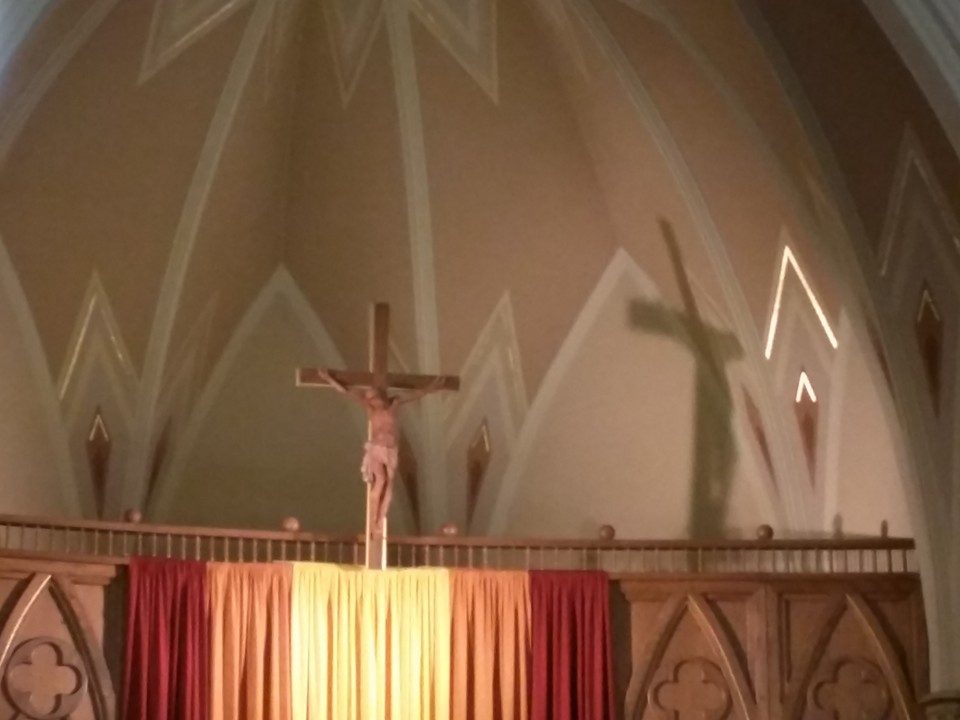
Lately, I’ve been musing a lot on how we are connected with each other. In Christianity there is a concept known as “The Communion of Saints.” The premise is that when we join together in Holy Communion, we share this moment with the Mystical Body of Christ, and with those who have lived in the past, those living in the present, and those in the future, and that we pray for each other.
In the Apostle’s Creed, which is present in many main stream churches, the following lines are recited:
I believe in the Holy Spirit,
the holy catholic Church,
the communion of saints,
the forgiveness of sins,
the resurrection of the body,
and life everlasting.
Amen.
Yet, I don’t think it is something we think about a whole lot.
And sadly, because of the difference in Catholic and Protestant understandings on the sacrament of communion, as well as the judgmental attitude of some of those in power, not all are welcome to receive at the table. Recently, there have been numerous articles about people being turned away from the altar because of political persuasion, or because of whom they love, or for simply not being “Practicing Catholics in Good Standing With the Church”
While theologically, I understand the complex arguments over whether the Eucharist has it been transformed from humble bread and wine into the Body and Blood of Christ, which is a term called transubstantiation; or is the Eucharist a symbol and remembrance of that day. I know what I believe personally, but how or why is it my business about what someone else believes? Yet in any church, any tradition, since the upper room, whenever Christians have gathered to share the cup and break the bread, they have followed the words of Jesus, “Do this, in memory of me” Yes, that is it. No matter what else we believe and profess, we are to be remembering Jesus.
There have been thousands of gallons of ink spilled on these distinctions, and my simplification may be from theology 101, and while there are reasons and strong beliefs around these distinctions, the thing is this: “Joe Schmoe in the pew doesn’t know, and doesn’t care.” If you asked many Catholics if they believed in Real Presence answers would be varied. Sadly, I can’t count the number of weddings or funerals or Sundays, where family members have been upset, because they have been told they cannot receive communion. I have seen weddings where people actually printed the rules for who may and may not receive in the worship aid! And then we wonder why folks are walking away from organized religion altogether, or seeking solace in communities that they find more welcoming to those in second marriages, LGBTQ members, or many other situations.
Now, believe it or not, delving into Eucharistic theology was not my purpose for writing today. My real purpose was to say this: I truly believe that Eucharist is only one of many ways we can experience this “Communion of the Saints,” this joining with those in the past, present and future. I think there are many others, so please indulge me.
The next liturgical example would be the Liturgy of the Hours, the prayer of the Church. This is prayer in perpetual motion. Somewhere, someone is always reciting morning prayer or vespers, or one of the minor hours. For example, when we pray the Divine Office, we may be praying a happy psalm when we are feeling sad, or an angry psalm when we are rejoicing. But as we gather in that sacred rhythm, we are praying for someone elsewhere in the world who needs that psalm right now. It is not about me sitting on the rocker in my bedroom praying the hours, or the religious community gathered in their chapel. It becomes a part of a prayer much larger, much greater. As the Vatican II Document Sacrosanctum Concilium said in paragraph 99, “the divine office is the voice of the Church, that is of the whole mystical body publicly praising God. ”
When I pray a psalm, or a sacred scripture, I can often recall another time that I have prayed that, and to remember what was happening at that time in my life, or what the scripture spoke to me then. The Word of God is never stagnant though. While that past experience may affect my prayer and interpretation of that reading today, I’ve been touched and shaped by new information and experiences since that time, and it may be saying something different and fresh to me today. Or it may be an amusing reminder, come back to teach me yet again, e.g. one of my favorite lines out of Psalm 32:8 “Be not like horse and mule, unintelligent, needing bridle and bit, or else they will not approach you.” (Grail Translation) whenever i see that I muse, reminding myself not to be so darned stubborn and thickheaded. And usually God and I have a little laugh about it. “Oh am I doing it again?” “Yes, Jilsy, you are.”
But there are many other ways that we commune with those who have gone before us. I’m not speaking of Ouija boards or visiting a psychic or a medium. Family members regularly go to gravesides to remember their loved ones. For me, cooking is often a way to “be” with my Mom, who has been gone for many years. Similarly, others go to special places, or engage in activities to remember loved ones.
But the most obvious thing that I can think of is the power of music. For those with dementia, music is one of the ways that people can be reached, and that often creates moments of clarity. Music therapy is also a way to help those who are in hospice find relief from pain . We all have had the experience of listening to a song on the radio, and being transformed back to the high school prom, or some other great life event. Music has a power to reach across time.
And this is where the concept of Communion of the Saints comes to mind. One of my favorite examples of this is the song “One Spirit, One Church” by Kevin Keil and Maryanne Quinlivan. In that hymn, the composers have combined “Come, Holy Ghost” which is a 7th century text, set to an 18th Century melody, LAMBILLOTTE, and then combined with a 20th Century refrain “We are a Pilgrim People.” So when we sing that hymn we are singing with those of the past, as well as those singing it today.
That is just one of thousands of examples. Every Advent we sing “O Come, Emmanuel” The verses of this song are taken from the 5th Century prayers of the Church which are different names for God. “O Key of David,” “O Emmanuel,” They were translated to English by John Mason Neale in 1861,
This year, as I was preparing for Christmas liturgies, I was doing my geek girl, and reveling at some of these details. “Lo, How a Rose E’er Blooming” was first published in 1599. I marvel at this simple tune surviving over 400 years. Nowadays, it is so simple to transcribe music with Finale or another program, and to make recordings of songs and put them up on many formats. To think that songs like “Lo, how a rose” and others have survived this long speaks of their beauty and power.
The other morning when we sang “Of the Father’s Love Begotten” for the liturgy I was transported back to when I was 18. I sang that song in Europe with “The Montana Youth Choir.” Then, when I was at Sacred Heart Monastery, that hymn was the opening of Vespers on Christmas Eve. For many years I directed the choir at Saint Frances Cabrini singing this same song.
When we prayed Taizé on New Years, we heard scriptures proclaimed in six languages, uniting us with people around the world, and prayed and sang the chants from the community that have been shared by millions. Again, as I sang them that night, I felt like I was also singing them with the Sisters of Sacred Heart Monastery, or the Benedictines in Winnipeg, where I first went to a workshop with a brother from the Taize community. I also remembered Sylvia in Virgina, and all of my friends who joined in making music at Saint Frances Cabrini. And as Sisters helped me tear down afterwards, I recalled those who were kind enough to stay afterwards and help me put things away when I was at the parish and so tired I could barely walk.
One could say, “O these are just examples of ways that music has touched you through your life. ” and indeed, that would be true. But I think it is much more powerful than that. When we start to sing along with “Journey” or “Bohemian Rhapsody” we are transformed. We are much younger, and we are once again invincible. We have not yet been broken down by the difficulties of life. Recently I played at a local club, and as a group of Sisters and friends sang along with me to Mary Hopkin’s “Those Were the Days” we were all transformed. When I get a group of friends singing “The Lion Sleeps Tonight,” or my gospel medely, a similar thing happens.
Music, Sacred or secular has the power to move us and to take us to places we have been in our past, or places we would like to go. It has the power to reunite friends and family whether we are separated by distance, or by death. Music has the power to transform us. Music has the power to heal us. And in that way, it is much like the Eucharist. When we share it and celebrate it, we become more than we are without it.


 Yesterday I played for three Ash Wednesday Services. Sometimes when you are so very close to the liturgy, you can get caught in the mechanics and logistics of making sure everything is set out correct and you didn’t forget anything; hoping the cantor gets it, having to pitch in for the sacristan who couldn’t make it, hoping the adjustment the sound crew made on the mics was correct, wondering why the numbers of people are different than last year, thinking about how much the
Yesterday I played for three Ash Wednesday Services. Sometimes when you are so very close to the liturgy, you can get caught in the mechanics and logistics of making sure everything is set out correct and you didn’t forget anything; hoping the cantor gets it, having to pitch in for the sacristan who couldn’t make it, hoping the adjustment the sound crew made on the mics was correct, wondering why the numbers of people are different than last year, thinking about how much the







